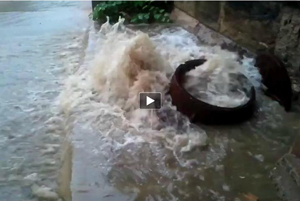By Tom Hoffman, Western Pennsylvania Director
Clean Water Action and the Clean Water Act are both turning 40 this year. In celebration of the fortieth anniversary of the Clean Water Act on October 18th, our water experts (and some friends) from across the country are writing about the Act.
Clean Water Action helped get the Clean Water Act passed because water is one of our nation’s most precious resources. Until 1972, we were simply not good stewards of our water. Our founder, David Zwick, exposed our nation’s water crisis and helped to devise the solutions that would become the Clean Water Act. We have made tremendous progress in the past 40 years – but more needs to be done.
A big example, and a problem that is on the front burner for many parts of the country, is pollution from stormwater runoff. Every time it rains in Pittsburgh, and in many other older, industrial cities, the sewer system is overwhelmed and millions of gallons of untreated sewage flow directly into our rivers. As our cities continue to age and grow, we need a new solution. We can find that solution in the Clean Water Act – it requires cities to find a sustainable way to deal with stormwater runoff.
We have to develop these sustainable answers quickly. Because of the increasingly dramatic effects of climate change, “hundred year storm events” are occuring with alarming frequency. The amlunt of sewage that flows into our rivers during a normal storm, let alone a "hundred year event", is unacceptable. The Clean Water Act requires cities to fix this problem. As citizens we need to make sure that the solution we pick is sustainable and provides the most benefits to our region. Luckily, in Western Pennsylvania, we have the Clean Rivers Campaign.
Clean Water Action is part of the Clean Rivers Campaign.
The campaign is advocating that our local sewer authority, ALCOSAN, integrate innovations like porous concrete and rain gardens as it redevelops our sewer system. These green solutions catch the rain where it falls and reduce stormwater flow into the sewers. While our region is one of many that has a problem with sewage in our rivers, we are in a very small minority of communities trying to fix the problem using only infrastructure like gigantic gray pipes. ALCOSAN needs to hear from us today.
One of the key principles guiding the Clean Water Act is that it makes more sense to avoid polluting rivers and streams than it does to allow pollution and devise a strategy to clean up the mess. It’s similar to one of those basic rules we all learned in kindergarten, it's easier to be proactive. A green approach to this problem can help us do that with stormwater AND provide so many other benefits along the way.
We know green infrastructure solutions are possible – Clean Water Action worked very closely with the Philadelphia Water Department to shape the bold green initiative that is coming together there. The idea is to use as much green infrastructure as you can, firsit, and then fill in the gaps with pipes – it’s a sensible strategy. The benefits of a green are many: jobs, cleaner air, higher property values, revitalized communities, cooler urban temperatures, potentially lower costs.
Those benefits need to be part of any region’s calculations when making the decision between green and gray. Solving the combined sewer overflow problem in Allegheny County will be the single largest public works investment our region has ever seen. As a region we need to get it right.
Across the country cities are making the right choice, the green choice – Milwaukee, Kansas City, Seattle, Chicago, New York. They know that their local economies will benefit from the short and long term jobs that green infrastructure brings. They know that green infrastructure investments will revitalize communities that have been hard hit by the recession. They know that green infrastructure is not a passing fad or “hippie” infrastructure but rather the face of the future. Clean Water Action, along with our partners in the CRC – Action United, Pennsylvania Interfaith Impact Network, Nine Mile Run watershed Association, the Sierra Club and Pittsburgh UNITED - urges ALCOSAN to join with these cities and adopt a green approach to solving the CSO problem in Allegheny County.



